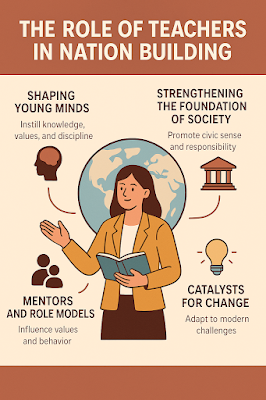Introduction
In the history of every great nation, the teachers are usually the silent heroes. There was a teacher for every leader, scientist, engineer, artist, or entrepreneur who believed in him or her. Teachers have a vital role in shaping individual lives and the fate of nations. They build the foundation for a robust, well-informed, and morally upright society.
Shaping Young Minds
Teachers are the designers of the human mind. Teachers impart knowledge, values, and discipline to the students—not just for the exams, but for life. The impact of a teacher goes far beyond the classroom, influencing students to think, behave, and respond to the world.
"A good teacher can inspire hope, ignite the imagination, and instill a love of learning." – Brad Henry
Strengthening the Foundation of Society
Education is the pillar of any forward-thinking nation. Educators construct that pillar by teaching the future generation of citizens. A nation with educated, knowledgeable, and moral citizens has a greater chance of flourishing socially, economically, and politically.
Teachers make their contributions by:
Encouraging civic awareness and responsibility
Instructing respect, tolerance, and harmony
Developing problem-solving and critical thinking capacity
Mentors and Role Models
Teachers are lifelong role models and guides. What they say and do determines students' understanding of success and failure, as well as values such as integrity, respect, and compassion. The endorsement of a teacher can inspire a child from a challenged background to overcome adversity and become extraordinary.
Catalysts for Change
In an ever-changing world, teachers guide students to accommodate contemporary challenges like digitalization, climate change, and global citizenship. Teachers are also champions of equiIntroduction
clusive education—guaranteeing every child, no matter their background, opportunity to succeed.
Visit my website: https://zaafar15.blogspot.com
Beyond the Curriculum
Nation-building extends beyond the classroom. Teachers are at the heart of:
Fostering peace and harmony
Raising awareness on social issues
Assisting mental health and well-being
Fostering innovation and entrepreneurship
Conclusion
Teachers are not teachers alone—they are builders of nations. Through their ability to develop talent, impart values, and mold young minds, they directly impact the nation's future. Investing in teachers is investing in the future of the nation.
Let us celebrate our teachers not only on one day, but every day—by backing education, upholding the profession, and acknowledging its unparalleled value within society.
Tags: Nation Building, Education, Role of Teachers, Civic Education, Future of Pakistan, Social Development, Teachers' Day
For more: Visit:

Comments
Post a Comment